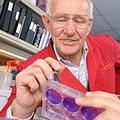 由美國國家衛生院(NIH)所資助開發的疫苗有重大突破,讓白老鼠及雪貂得以對致命的禽流感病毒產生抗體。該項於美國曼菲斯聖猶大兒童研究醫院所進行的疫苗實驗裡,成功地讓實驗室動物得以對抗禽流感;此結果象徵著即便禽流感病毒再生突變並取得透過人體傳染的能力,此疫苗將足以保護人類健康。
由美國國家衛生院(NIH)所資助開發的疫苗有重大突破,讓白老鼠及雪貂得以對致命的禽流感病毒產生抗體。該項於美國曼菲斯聖猶大兒童研究醫院所進行的疫苗實驗裡,成功地讓實驗室動物得以對抗禽流感;此結果象徵著即便禽流感病毒再生突變並取得透過人體傳染的能力,此疫苗將足以保護人類健康。
聖猶大疾病傳染學系助理教員韋比博士(Richard Webby)指出,搭配早先研究的結果顯示疫苗能對抗多種人類流感病毒,因此,此種疫苗將能保護人類免於多種人流感或禽流感病毒的危害。
韋比聲稱此種疫苗能對抗那些不僅能在鳥類間傳染,突變後甚至極為容易在人群中大量散佈的H5N1禽流感病毒。病毒專家以及公共衛生部門官員憂心變種的H5N1病毒將引發一場全人類的感冒大流行。
研發疫苗的加州公司Vical的執行長沙門(Vijay Samant)指出:「對我們苦心研製出的禽流感病毒疫苗及其可交互保護的結果,我們深受鼓舞。」
實驗採實驗組與控制群相互比較,每組為16隻老鼠或6隻雪貂。在實驗中研究員使用兩種Vical公司之DNA序列疫苗。其中一個疫苗針對三個病毒蛋白質-NP,M2,H5,研究中的另一個疫苗只包含二個病毒蛋白質-NP及M2。
在聖猶大的研究中,三元素的疫苗 (H5, NP, M2)能完全保護老鼠免於高致死風險的H5N1禽流感病毒。
一月,匹茲堡大學的科學家宣布他們應用基因工程技術從致命的H5N1病毒身上研製出一個禽流感疫苗,它可完全保護老鼠及雞隻免於感染。這種疫苗可迅速製造並且引發動物自身強大的免疫反應,使得它極有潛力成為防堵病毒大肆蔓延的利器。
研究人員指出這種疫苗包含一個活的病毒,以至於它相較於由傳統方法所製造的禽流感疫苗較能引起人體的免疫反應。根據2月15日的「病毒學期刊」所刊載的研究指出,由於該疫苗是由細胞所生長,所以比起傳統疫苗更能快速地大量複製。
A commercially developed vaccine funded by the U.S. National Institutes of Health has protected mice and ferrets against a deadly bird flu viral strain. The success of the vaccine in protecting laboratory animals from bird flu virus during studies performed at St. Jude Children Research Hospital in Memphis suggests that it would protect humans if the virus mutates and acquires the ability to spread from person to person.
The finding, coupled with results of previous studies that showed protection against multiple human influenza strains, suggests that such a vaccine would protect humans against multiple variants of the bird and human influenza viruses, said Richard Webby, PhD, assistant member of the faculty in the Department of Infectious Diseases at St. Jude.
Webby said such a vaccine could protect people against an H5N1 bird flu virus that mutates to adapt to humans, not just birds, and easily can spread from person to person. Flu experts and public health officials fear that such a variant of H5N1 would trigger a global human pandemic.
The California company Vical Inc. developed the vaccine. "We are encouraged by the protection afforded by our avian flu vaccine and by the cross-protection data," said Vijay Samant, president and CEO of Vical.
The studies included 16 mice or six ferrets in each vaccine or control group, and the investigators used two versions of Vical's DNA-based vaccine in the studies. One vaccine was directed against three viral proteins – NP, M2 and H5. The other vaccine used in the study contained only the two conserved viral proteins, NP and M2.
In the St. Jude study, the three-component vaccine (H5, NP, M2) protected the mice completely against potentially lethal challenges with a highly virulent H5N1 avian influenza virus.
In January, University of Pittsburgh scientists announced that they genetically engineered a bird flu vaccine from components of the deadly H5N1 virus that completely protected mice and chickens from infection. The vaccine can be made quickly and induced a strong immune response in the animals, making it a potentially useful tool for preventing the spread of the virus.
This vaccine contains a live virus, so it activates immune responses better than avian flu vaccines prepared by traditional methods, say the researchers. Because it is grown in cells, it can be produced much more quickly than traditional vaccines, according to the study, published in the February 15 issue of the "Journal of Virology."


